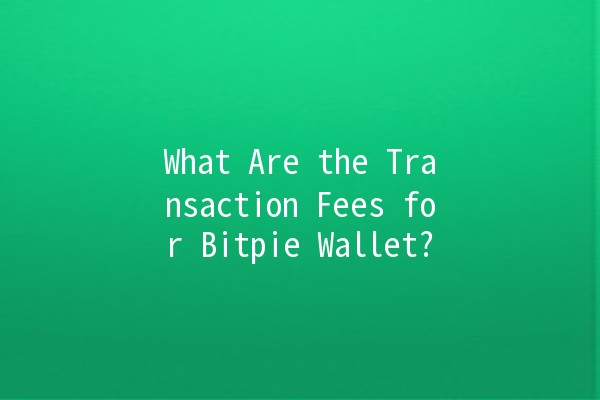
Cryptocurrency wallets play a crucial role in managing your digital assets. As the popularity of cryptocurrencies grows, understanding the fees associated with wallets like Bitpie becomes essential for any investor. This article provides an indepth look at the transaction fees of Bitpie Wallet, covering everything from basic concepts to specific strategies for optimizing your transaction cost.
Understanding Bitpie Wallet
Bitpie Wallet is a wellknown digital wallet specifically designed for managing various cryptocurrencies. It supports major cryptocurrencies such as Bitcoin, Ethereum, and many altcoins, allowing users to store, send, and receive digital assets securely. Like many cryptocurrency wallets, Bitpie charges transaction fees when you send or receive digital currency.
Types of Fees in Cryptocurrency Transactions
How to Determine the Fees for Bitpie Wallet
To find the exact transaction fees associated with Bitpie, it's best to check the official website or the app directly, as these fees can change frequently. Bitpie frequently updates its fee structure based on market conditions and operational costs.

Tips for Reducing Transaction Fees
Example: If you're planning to transfer Bitcoin, check fee tracking websites like Mempool.space to identify less congested times for transaction processing.
Example: A user could set up a Lightning Network wallet to facilitate small transactions without incurring high fees, averaging only a few cents per transaction.
Example: Instead of sending small amounts of Ethereum to different friends, sum those amounts and send a single transfer. This practice saves both time and money.
Example: Instead of transacting in Bitcoin, which might have a high fee due to network congestion, you might want to use Litecoin or Ripple during times of heavy network load.
Example: Websites like BTCscan provide realtime fee estimates for Bitcoin transactions, enabling users to forecast when to send their funds for the lowest cost.
Common Questions About Bitpie Wallet Fees
No, Bitpie Wallet does not charge an annual fee for holding accounts. The only fees incurred are those associated with transactions, such as network fees and optional service fees based on the type of activity you perform within the wallet.
Yes, Bitpie may impose minimum withdrawal amounts depending on the cryptocurrency. These limits ensure that processing costs associated with withdrawals are justified. You should check the specific limits for each cryptocurrency within the wallet interface.
While users may not have direct control over how much to pay in transaction fees due to network conditions, some wallets allow users to choose between different fee levels (like low, medium, or high priority). However, Bitpie generally sets fees automatically based on current network conditions to ensure timely processing.
Bitpie updates its fees based on changes in network conditions and operational costs. Users are advised to check the latest fee structure on the app or the website, as fees can change frequently due to market fluctuations.
Typically, transaction fees in cryptocurrency transactions are paid in the cryptocurrency being sent. For instance, if you are sending Bitcoin, the fee will be deducted in Bitcoin as well. Be mindful of your wallet balance to ensure you have enough funds for both the transaction and the fee.
If you find that transaction fees are consistently high, consider utilizing the aforementioned strategies to reduce costs. Exploring alternative cryptocurrencies for your transactions, timing your trades, or using solutions like the Lightning Network can lead to savings in transaction fees, making your cryptocurrency management more efficient.
Understanding the transaction fees associated with Bitpie Wallet is essential for users aiming to maximize their cryptocurrency experience. By being aware of the various types of fees and implementing costreducing strategies, you can navigate the digital currency landscape more effectively. Embrace these practices to enhance your crypto journey while keeping costs in check!

